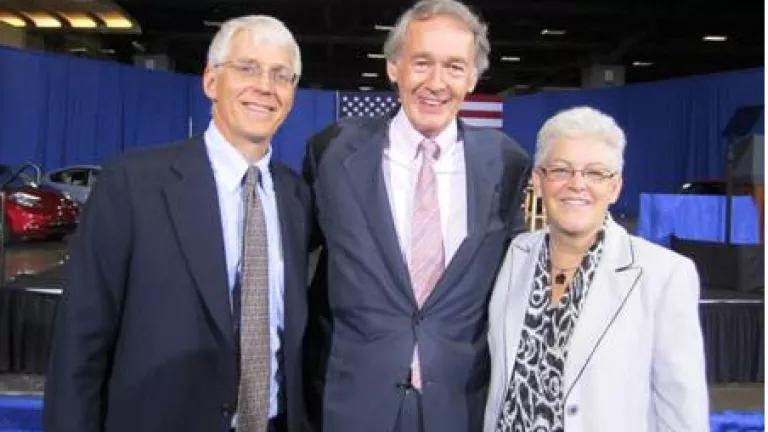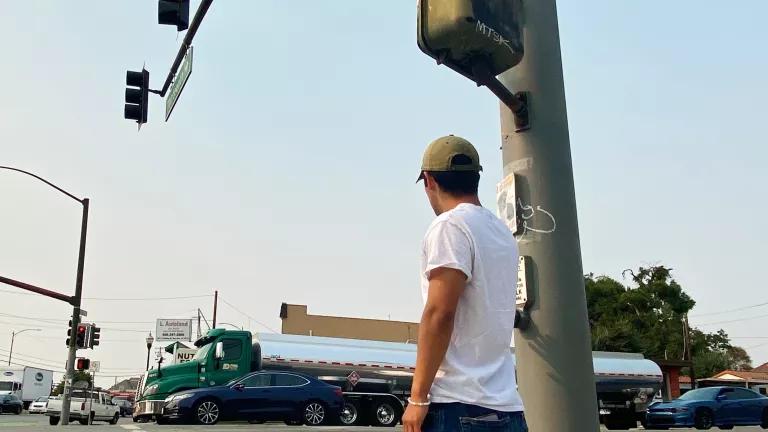
Today my colleague Luke Tonachel and I represented NRDC at the Washington ceremony where President Obama announced a triumph of American leadership, the single largest step we can take to break our costly addiction to oil.
By 2025, new cars and light trucks in this county will go about twice as far, on average, on a gallon of gas, compared with today’s vehicles.
The difference will save Americans $80 billion a year at the pump. It will reduce our oil use by 3.1 million barrels per day by 2030. It will cut automobile carbon emissions in half. And it will create up to150,000 American jobs, as Detroit shows the world how to build the next generation of energy efficient cars.
If you're as tired as I am of those naysayers and hand wringers who always seem ready to run down any solution that dares rear its head, this was the perfect midsummer antidote. It reminds us that this is a can-do nation with a long history of rising to challenge and embracing opportunity.
Power companies once told us they could not take the acid out of smoke stack pollution without dramatically raising the cost of electricity. Yet, once told to do it, they cut sulfur emissions by half at little cost. Oil companies said they could not take lead out of gas without huge increases in the price of gasoline. Yet, once told to do it, they did so without any noticeable price increase. Same story with seat belts and air bags.
All one hears on Capitol Hill these days is that America can’t do it – we can’t drill for gas more safely and keep the costs down, we can’t reduce toxic pollution from power plants and refineries, you name it.
History shows all these claims are wrong, or at least vastly overstated.
What was so wonderful about today was that the manufacturers, the workers and others all dropped the whining and agreed to do what's best for this country and our children's future. That's the real triumph here.
In fact our automakers - Ford, General Motors and Chrysler, along with Honda, Toyota, Volvo and seven others that together account for 90 percent of U.S. auto sales - worked with environmental groups, the United Auto Workers, state and federal officials and others to reach agreement on this historic goal.
On the environmental front, this is a giant leap forward. Our cars and trucks belch out 1.7 billion tons of climate-warming carbon dioxide emissions each year, accounting for 28 percent of our national carbon footprint. Cutting those emissions by nearly half is huge.
"So when your kids are biking around the neighborhood, they'll be breathing less pollution and fewer toxins," as Obama put it. "It means we're doing more to protect our air and water, and it means we're reducing the carbon pollution that threatens our climate."
Those reductions alone would make this a stunning achievement. That, though, is just the beginning.
Americans know that when we put ten gallons of gas in the tank, six are coming from Saudi Arabia, Russia, Venezuela and other oil-producing nations, many of which don't share our values or goals. Every day in this country, we send about $1 billion abroad just to buy imported oil, money we’d be better off investing in good manufacturing jobs here at home. And our men and women in uniform are deployed worldwide on missions that include safeguarding our access to these imports.
With our economy, our security and our very future held hostage to crude imports, presidents going back to Richard Nixon have called on the nation to break our costly dependence on oil. Better gas mileage will help.
Combined with existing fuel efficiency standards that begin with 2012 models, the new standards for 2025 will reduce our oil use by some 3 million barrels per day by 2030. Over time, the White House estimates, those savings will grow to 4 million barrels per day, as older cars are retired and more efficient vehicles take their place.
That's going to save the typical consumer a whopping $8,200 in fuel costs, the White House estimates, over the life of cars bought after 2025, as compared with today's average driving costs.
Finally, achieving these goals will make the American auto industry more competitive at home and abroad, by driving the creation of the next generation of energy efficient components and cars.
We'll improve auto gas mileage, after all, by making our engines and transmissions more efficient, with, for instance, engines that shut down cylinders when they're not needed. We'll use more efficient power sources, like diesel engines that are typically 20 percent more efficient than their gasoline counterparts, as well as electric and hybrid vehicles.
"We're going to have to harness the potential of startups and clean energy companies across America," Obama said. "We need to tap into this reservoir of innovation and enterprise."
As the president spoke, I couldn't help but contrast the progress we've made getting more from a tank of gas with the seeming inability of Congress to perform what may be its single most fundamental Constitutional charge: managing the federal budget.
Getting this done required leadership, commitment and compromise from everyone involved.
We didn't first sit down - carmakers, union workers, environmentalists and others - in full agreement on all of this. And yet, with the president's vision to guide us, we worked through our differences and developed a plan that will serve our country and its people for decades.
It goes to show how much we can accomplish, as a nation, when together we set our sights on a common goal and dedicate ourselves to its achievement.
It's about doing what's best for our country, a nation that knows how to roll up its sleeves and get things done.



